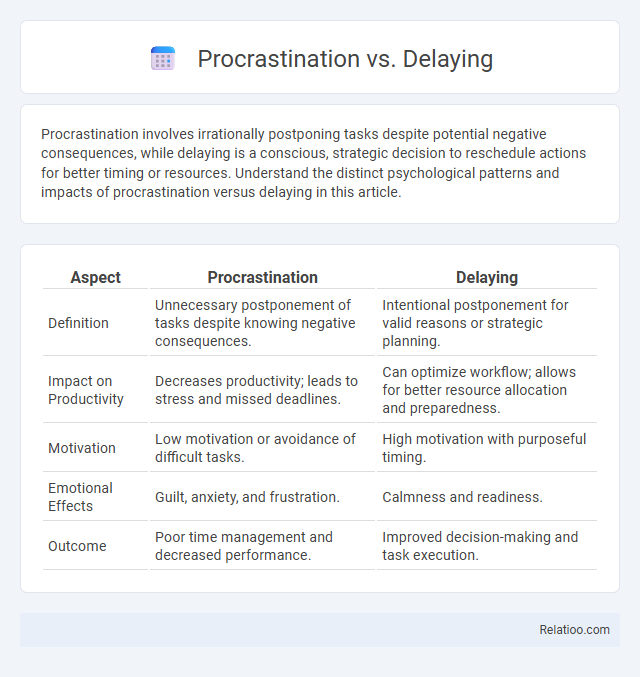Procrastination involves irrationally postponing tasks despite potential negative consequences, while delaying is a conscious, strategic decision to reschedule actions for better timing or resources. Understand the distinct psychological patterns and impacts of procrastination versus delaying in this article.
Table of Comparison
| Aspect | Procrastination | Delaying |
|---|---|---|
| Definition | Unnecessary postponement of tasks despite knowing negative consequences. | Intentional postponement for valid reasons or strategic planning. |
| Impact on Productivity | Decreases productivity; leads to stress and missed deadlines. | Can optimize workflow; allows for better resource allocation and preparedness. |
| Motivation | Low motivation or avoidance of difficult tasks. | High motivation with purposeful timing. |
| Emotional Effects | Guilt, anxiety, and frustration. | Calmness and readiness. |
| Outcome | Poor time management and decreased performance. | Improved decision-making and task execution. |
Understanding Procrastination: Definition and Causes
Procrastination refers to the habitual avoidance of tasks despite anticipating negative consequences, driven by factors such as fear of failure, perfectionism, and low motivation. Unlike simple delaying, which is a conscious choice to postpone tasks for practical reasons, procrastination involves an emotional or psychological struggle that impairs timely action. Understanding the underlying causes of procrastination, including anxiety, impulsivity, and self-regulation difficulties, is essential for developing effective strategies to overcome it.
What Does Delaying Really Mean?
Delaying refers to the intentional act of postponing tasks or decisions, often for practical reasons such as waiting for more information or better timing. Unlike procrastination, which involves avoidance due to fear or lack of motivation, delaying is a strategic pause that can lead to improved outcomes. Understanding the difference helps in managing time effectively and distinguishing between productive delays and counterproductive procrastination.
Procrastination vs Delaying: Key Differences
Procrastination involves irrationally postponing tasks despite knowing the negative consequences, often driven by fear or lack of motivation, while delaying is a conscious, strategic decision to put off an action for practical reasons. You can differentiate procrastination from delaying by evaluating intent and outcome: procrastination leads to stress and lowered productivity, whereas delaying allows for better planning and prioritization. Understanding these distinctions helps improve time management and reduces unnecessary stress in your workflow.
Psychological Triggers Behind Procrastination
Psychological triggers behind procrastination include fear of failure, perfectionism, and low self-confidence, which cause You to avoid tasks despite their importance. Unlike simple delaying, which may result from external factors or prioritization, procrastination is driven by emotional and cognitive barriers that disrupt motivation. Understanding these triggers allows for targeted strategies to overcome avoidance behaviors and enhance productivity.
When Is Delaying Actually Productive?
Delaying becomes productive when it involves intentional postponement to gather more information, prioritize tasks effectively, or allow for creative incubation, thereby enhancing decision quality and output. Unlike procrastination, which is characterized by avoidance and irrational postponement leading to stress and reduced productivity, productive delaying aligns with strategic time management and goal-oriented behavior. Recognizing the purpose and outcome of the delay distinguishes it from procrastination, making it a valuable tool in optimizing workflow and improving performance.
The Impact of Procrastination on Goals and Well-being
Procrastination significantly undermines your goal achievement by creating unnecessary stress and reducing productivity, often leading to missed deadlines and subpar results. Unlike simple delaying, which is a conscious decision to postpone tasks for valid reasons, procrastination involves avoidance driven by fear, anxiety, or lack of motivation, negatively impacting mental health and overall well-being. Addressing procrastination through time management strategies and self-discipline is crucial to maintain focus, reduce anxiety, and improve personal and professional success.
Benefits of Strategic Delaying
Strategic delaying allows individuals to prioritize tasks effectively, enhancing decision-making quality by allocating time for reflection and gathering necessary resources. Unlike procrastination, which often stems from avoidance and leads to stress, strategic delaying is a purposeful pause that improves productivity and problem-solving. This approach optimizes task management by balancing urgency and importance, resulting in better outcomes and reduced burnout.
Recognizing Your Patterns: Procrastinator or Delayer?
Procrastination involves habitual avoidance of tasks due to fear or perfectionism, while delaying often stems from intentional prioritization or external constraints. Recognizing your patterns requires analyzing emotional triggers, task types, and decision-making processes to determine if avoidance or strategic postponement drives your behavior. Identifying whether you are a procrastinator or delayer enables targeted strategies for productivity improvement and time management.
Techniques to Overcome Unhelpful Procrastination
Techniques to overcome unhelpful procrastination include breaking tasks into smaller, manageable steps to reduce overwhelm and increase motivation. Time-blocking methods and the Pomodoro Technique help create structured work intervals, enhancing focus and productivity. Mindfulness practices and self-compassion also address underlying anxiety and self-critical thoughts that fuel procrastination, promoting healthier work habits.
Building Healthy Habits: Turn Delaying Into Progress
Delaying is a conscious decision to postpone tasks with a clear intention, while procrastination involves habitual avoidance despite knowing the negative impact on your goals. You can build healthy habits by identifying the reasons behind delays and scheduling focused work sessions to transform hesitation into productive momentum. Consistently replacing procrastination with intentional progress enhances time management and fosters long-term success.

Infographic: Procrastination vs Delaying
 relatioo.com
relatioo.com